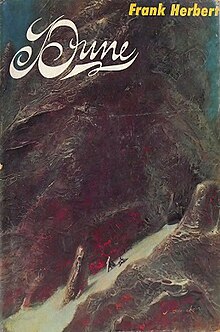
Back Dune (roman) AF كثيب (رواية) Arabic Dyuna (roman) AZ Дюн Bulgarian Duna (novel·la) Catalan Duna (román) Czech Dune CY Klit (roman) Danish Dune – die erste Trilogie German Dune (μυθιστόρημα) Greek
 First edition cover | |
| Author | Frank Herbert |
|---|---|
| Cover artist | John Schoenherr |
| Country | United States |
| Language | English |
| Series | Dune series |
| Genre | Science fiction[1] |
| Published | Serialised 1963–65; book form August 1965 |
| Publisher | Chilton Books |
| Media type | Print (hardcover & paperback) |
| Pages | 896 |
| Followed by | Dune Messiah |
Dune is a 1965 epic science fiction novel by American author Frank Herbert, originally published as two separate serials (1963-64 novel 'Dune World' and 1965 novel 'Prophet of Dune') in Analog magazine. It tied with Roger Zelazny's This Immortal for the Hugo Award for Best Novel and won the inaugural Nebula Award for Best Novel in 1966. It is the first installment of the Dune Chronicles. It is one of the world's best-selling science fiction novels.[2]
Dune is set in the distant future in a feudal interstellar society in which various noble houses control planetary fiefs. It tells the story of young Paul Atreides, whose family accepts the stewardship of the planet Arrakis. While the planet is an inhospitable and sparsely populated desert wasteland, it is the only source of melange, or "spice", a drug that extends life and enhances mental abilities. Melange is also necessary for space navigation, which requires a kind of multidimensional awareness and foresight that only the drug provides. As melange can only be produced on Arrakis, control of the planet is a coveted and dangerous undertaking. The story explores the multilayered interactions of politics, religion, ecology, technology, and human emotion as the factions of the empire confront each other in a struggle for the control of Arrakis and its spice.
Herbert wrote five sequels: Dune Messiah, Children of Dune, God Emperor of Dune, Heretics of Dune, and Chapterhouse: Dune. Following Herbert's death in 1986, his son Brian Herbert and author Kevin J. Anderson continued the series in over a dozen additional novels since 1999.
Adaptations of the novel to cinema have been notoriously difficult and complicated. In the 1970s, cult filmmaker Alejandro Jodorowsky attempted to make a film based on the novel. After three years of development, the project was canceled due to a constantly growing budget. In 1984, a film adaptation directed by David Lynch was released to mostly negative responses from critics and failure at the box office, although it later developed a cult following. The book was also adapted into the 2000 Sci-Fi Channel miniseries Frank Herbert's Dune and its 2003 sequel, Frank Herbert's Children of Dune (the latter of which combines the events of Dune Messiah and Children of Dune). A second film adaptation, directed by Denis Villeneuve, was released on October 21, 2021, to positive reviews. It grossed $434 million worldwide and went on to be nominated for ten Academy Awards, including Best Picture, ultimately winning six. Villeneuve's film covers roughly the first half of the original novel; a sequel, which covers the second half of the story, was released on March 1, 2024, to critical acclaim and has grossed $668 million worldwide.
The series has also been used as the basis for several board, role-playing, and video games.
Since 2009, the names of planets from the Dune novels have been adopted for the real-life nomenclature of plains and other features on Saturn's moon Titan.